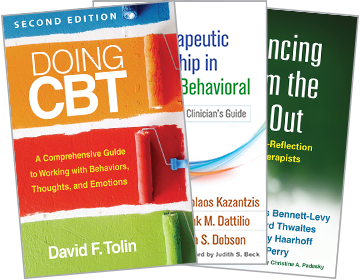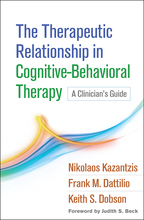The Therapeutic Relationship in Cognitive-Behavioral Therapy
A Clinician's Guide
Nikolaos Kazantzis, Frank M. Dattilio, and Keith S. Dobson
Foreword by Judith S. Beck
Hardcovere-bookprint + e-book
Hardcover
orderAugust 7, 2017
ISBN 9781462531288
Price: $39.00288 Pages
Size: 6" x 9"
Check out a special package offer including this title!

Professors: request an exam copy
Read a Q&A with featured author, Frank M. Dattilio!
The reproducible materials can be downloaded and printed in PDF format.
The reproducible materials can be downloaded and printed in PDF format.
“The Therapeutic Relationship in Cognitive-Behavioral Therapy (CBT) shines a spotlight on a topic that is an essential part of this evidence-based psychotherapy….Very few books on CBT focus exclusively on the therapeutic relationship, which is why this volume is important. It helps clinicians understand how the therapeutic relationship is embedded in the fundamental elements of treatment….A particular strength of the book is the opportunity for clinicians to engage in self-reflection….Especially suited for the intermediate to advanced CBT therapist to gain further insight into how the therapeutic relationship can be used to full advantage in various key aspects of treatment.”

—Journal of Psychiatric Practice
“This is a superlative, needed, and timely book. While more and more lip service has been given to the importance and efficacy of the therapeutic relationship, this book bridges the gap and provides clear, well-documented, and highly informative information on strategies to enhance the therapeutic relationship and, importantly, to deal with its rupture. Its provision of self-reflection exercises coupled with therapeutic tips increases its value. It is thorough and comprehensive and can be remarkably helpful for beginning therapists as well as those who have been in practice for some time. This will be an excellent text to use in any behaviorally focused graduate training program in psychology, psychiatry, or social work and needs to be an added book in any curriculum where therapeutic strategies and techniques are presented.”

—Child and Family Behavior Therapy
“The therapeutic relationship is the heart and soul of CBT. This is just the book that is needed to link the many exemplary volumes on CBT technique to the practice of CBT in the room with real clients. The authors’ rich clinical experience shines through in the case examples and in their deep understanding of the realities of practice. Not surprisingly from these authors, the book consistently draws on the empirical literature. Reading this book is the next best thing to having one of these outstanding professionals as your clinical supervisor. This book will be a strong addition to graduate curricula, but also has much to offer for the experienced practitioner. The self-reflection exercises nicely model the collaborative relationship at the core of CBT.”

—Debra A. Hope, PhD, Department of Psychology, University of Nebraska–Lincoln
“Experienced clinicians know that therapy is not simply the application of 'techniques' to solve the client’s problems. Some therapists have high dropout rates, while others are able to connect and encourage clients to explore and grow even when difficulties arise. This important contribution aids in the development of effective, compassionate therapist–client relationships. Grounded in theory and the empirical literature, the book provides guidelines on agenda setting, homework compliance, behavioral assignments, and cognitive interventions. It shows how different ways of addressing roadblocks can either impede or enrich the therapeutic process. Clinicians at all levels will benefit from the authors' insight and wisdom.”

—Robert L. Leahy, PhD, Department of Psychiatry, Weill Cornell Medical College; Director, American Institute for Cognitive Therapy
“This superb book demonstrates like no other that the practice of CBT is a human, rather than mechanical, process. Socratic dialogue and collaborative empiricism are presented not as strategies to employ, but rather as crucial components of the therapeutic relationship. This book will enhance the library of beginning students as well as novice and seasoned clinicians. It will serve as an invaluable reference for therapists to return to again and again in reflecting on the case conceptualization and maintaining a therapeutic relationship, within the context of competent and ethical CBT. I plan to use it in a seminar I am teaching on the psychotherapeutic process, and think it would be excellent required reading for a broader class on CBT.”

—Christopher R. Martell, PhD, ABPP, Clinic Director, Psychological Services Center, University of Massachusetts, Amherst
“Until now, there has not been a comprehensive resource to guide CBT practitioners in utilizing the special and unique therapeutic relationship to help clients achieve long-lasting change. This book meets an essential clinical need—and does so brilliantly. The authors provide a wealth of information about both generic and CBT-specific elements of forming effective therapeutic relationships. They have structured the book skillfully into easy-to-follow chapters, each targeting key components of conducting CBT. Case illustrations with sample dialogues, clinical tips, and self-reflection exercises engage readers in applying the ideas in their own practices. Students and clinicians will repeatedly return to these pages for sound advice.”

—Joan Davidson, PhD, Co-Director, San Francisco Bay Area Center for Cognitive Therapy; Assistant Clinical Professor, University of California, Berkeley
“The authors articulate the value and nature of the therapeutic relationship, clearly describing the scientific method and the generation of clinically important hypotheses and their evaluation through experimentation. Other crucial aspects of CBT include the therapist’s use of questioning and the Socratic teaching approach, which enable the clinician to guide clients to a new perspective or discovery. These strategies are essential features of the therapeutic relationship, both directly and indirectly (when embedded in techniques), and they lead to change in clients’ basic maladaptive beliefs and perceptions.”

—from the Foreword by Judith S. Beck, PhD, President, Beck Institute for Cognitive Behavior Therapy
—Journal of Psychiatric Practice
“This is a superlative, needed, and timely book. While more and more lip service has been given to the importance and efficacy of the therapeutic relationship, this book bridges the gap and provides clear, well-documented, and highly informative information on strategies to enhance the therapeutic relationship and, importantly, to deal with its rupture. Its provision of self-reflection exercises coupled with therapeutic tips increases its value. It is thorough and comprehensive and can be remarkably helpful for beginning therapists as well as those who have been in practice for some time. This will be an excellent text to use in any behaviorally focused graduate training program in psychology, psychiatry, or social work and needs to be an added book in any curriculum where therapeutic strategies and techniques are presented.”
—Child and Family Behavior Therapy
“The therapeutic relationship is the heart and soul of CBT. This is just the book that is needed to link the many exemplary volumes on CBT technique to the practice of CBT in the room with real clients. The authors’ rich clinical experience shines through in the case examples and in their deep understanding of the realities of practice. Not surprisingly from these authors, the book consistently draws on the empirical literature. Reading this book is the next best thing to having one of these outstanding professionals as your clinical supervisor. This book will be a strong addition to graduate curricula, but also has much to offer for the experienced practitioner. The self-reflection exercises nicely model the collaborative relationship at the core of CBT.”
—Debra A. Hope, PhD, Department of Psychology, University of Nebraska–Lincoln
“Experienced clinicians know that therapy is not simply the application of 'techniques' to solve the client’s problems. Some therapists have high dropout rates, while others are able to connect and encourage clients to explore and grow even when difficulties arise. This important contribution aids in the development of effective, compassionate therapist–client relationships. Grounded in theory and the empirical literature, the book provides guidelines on agenda setting, homework compliance, behavioral assignments, and cognitive interventions. It shows how different ways of addressing roadblocks can either impede or enrich the therapeutic process. Clinicians at all levels will benefit from the authors' insight and wisdom.”
—Robert L. Leahy, PhD, Department of Psychiatry, Weill Cornell Medical College; Director, American Institute for Cognitive Therapy
“This superb book demonstrates like no other that the practice of CBT is a human, rather than mechanical, process. Socratic dialogue and collaborative empiricism are presented not as strategies to employ, but rather as crucial components of the therapeutic relationship. This book will enhance the library of beginning students as well as novice and seasoned clinicians. It will serve as an invaluable reference for therapists to return to again and again in reflecting on the case conceptualization and maintaining a therapeutic relationship, within the context of competent and ethical CBT. I plan to use it in a seminar I am teaching on the psychotherapeutic process, and think it would be excellent required reading for a broader class on CBT.”
—Christopher R. Martell, PhD, ABPP, Clinic Director, Psychological Services Center, University of Massachusetts, Amherst
“Until now, there has not been a comprehensive resource to guide CBT practitioners in utilizing the special and unique therapeutic relationship to help clients achieve long-lasting change. This book meets an essential clinical need—and does so brilliantly. The authors provide a wealth of information about both generic and CBT-specific elements of forming effective therapeutic relationships. They have structured the book skillfully into easy-to-follow chapters, each targeting key components of conducting CBT. Case illustrations with sample dialogues, clinical tips, and self-reflection exercises engage readers in applying the ideas in their own practices. Students and clinicians will repeatedly return to these pages for sound advice.”
—Joan Davidson, PhD, Co-Director, San Francisco Bay Area Center for Cognitive Therapy; Assistant Clinical Professor, University of California, Berkeley
“The authors articulate the value and nature of the therapeutic relationship, clearly describing the scientific method and the generation of clinically important hypotheses and their evaluation through experimentation. Other crucial aspects of CBT include the therapist’s use of questioning and the Socratic teaching approach, which enable the clinician to guide clients to a new perspective or discovery. These strategies are essential features of the therapeutic relationship, both directly and indirectly (when embedded in techniques), and they lead to change in clients’ basic maladaptive beliefs and perceptions.”
—from the Foreword by Judith S. Beck, PhD, President, Beck Institute for Cognitive Behavior Therapy



